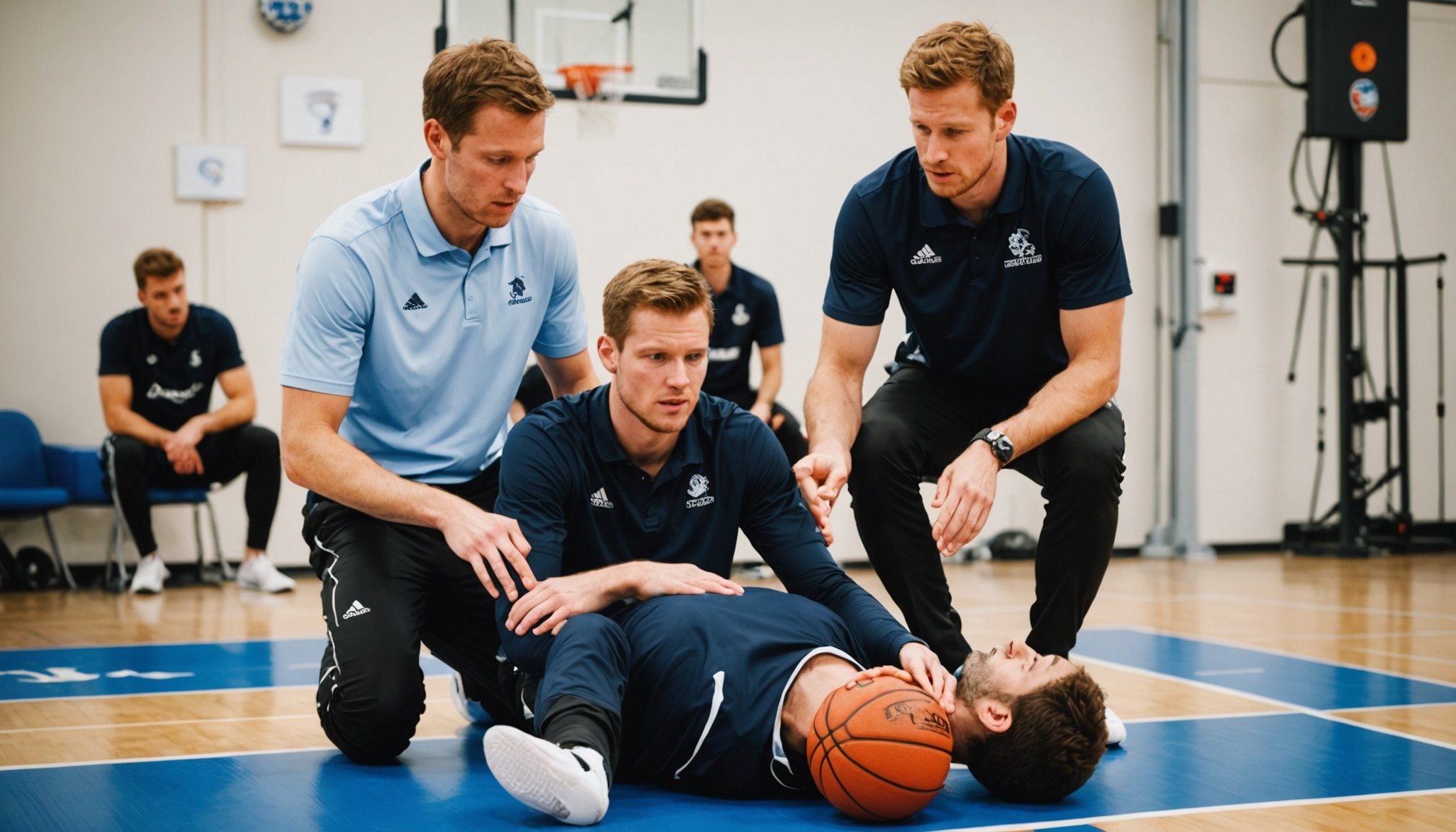Discover the Latest Sports Physiotherapy Innovations Reshaping Performance for UK Basketball Athletes
The Evolving Landscape of Sports Physiotherapy in UK Basketball
Sports physiotherapy has become a cornerstone in the world of athletics, particularly in high-intensity sports like basketball. In the UK, basketball is experiencing a significant surge in popularity and performance, thanks in part to innovative physiotherapy practices. This article delves into the latest advancements and how they are transforming the game for UK basketball athletes.
The Role of Physiotherapists in Basketball Teams
Physiotherapists are no longer just sideline support; they are integral members of the team. For instance, the Caledonia Gladiators, a prominent basketball team in the UK, are actively seeking a physiotherapist to work with their elite athletes. This role involves not only treating injuries but also enhancing athletic performance through specialized training and recovery programs.
Also to see : Top Cognitive Training Tools to Boost Decision-Making Skills for Basketball Players in the UK
Advanced Technologies in Sports Physiotherapy
The integration of cutting-edge technologies is revolutionizing sports physiotherapy. Here are some key innovations making waves in UK basketball:
Blood Flow Restriction (BFR) Technology
One of the most exciting developments is the use of Blood Flow Restriction (BFR) technology. Leicester Riders, a storied team in British basketball, have partnered with Hytro, a leading innovator in BFR wearables. This technology restricts blood flow to the muscles, allowing athletes to train at lower intensities while still achieving high-intensity benefits. This approach is crucial for injury prevention and performance enhancement.
In parallel : Top Drills to Boost Ball-Handling Mastery for UK Basketball Point Guards
“British basketball is a sleeping giant with immense untapped potential, and partnering with forward-thinking organisations like Leicester Riders allows us to elevate the performance of their squad and bring higher athletic standards to the game,” said Richard Frost, Hytro’s chief marketing officer.
Data-Driven Physiotherapy
The use of data in sports physiotherapy is becoming increasingly important. Here’s how data is being utilized to improve athlete performance:
Real-Time Performance Analysis
Real-time data analysis is allowing physiotherapists to monitor athlete performance more closely than ever before. This includes tracking heart rate, muscle activity, and other physiological metrics during training and games. For example, the University of Essex offers advanced sports science programs that include real-time performance analysis, helping athletes and coaches make informed decisions about training programs and injury prevention.
Injury Prevention and Management
Data is also crucial in injury prevention and management. By analyzing historical data and real-time metrics, physiotherapists can identify potential injury risks and implement preventive measures. Here are some ways data is used in injury prevention:
- Predictive Analytics: Using historical data to predict the likelihood of injuries based on training patterns and athlete health.
- Real-Time Monitoring: Tracking athletes’ physical condition in real time to identify early signs of injury.
- Personalized Training Programs: Creating customized training programs based on individual athlete data to reduce the risk of injury.
Mental Health and Sports Physiotherapy
Mental health is an often-overlooked aspect of athletic performance, but it is gaining more attention in the sports physiotherapy community.
The Intersection of Physical and Mental Health
Physical therapy is not just about treating physical injuries; it also involves addressing the mental health of athletes. The stress and pressure of competitive sports can take a toll on athletes’ mental well-being. Here’s how sports physiotherapy is addressing this:
- Sports Psychology: Integrating sports psychology into physiotherapy programs to help athletes manage stress, anxiety, and other mental health challenges.
- Holistic Approach: Taking a holistic approach to athlete care, considering both physical and mental health in treatment plans.
Practical Insights and Actionable Advice
For athletes, coaches, and physiotherapists, here are some practical insights and actionable advice to leverage these innovations:
Building a Comprehensive Training Program
- Incorporate BFR Technology: Consider integrating BFR technology into your training programs to enhance performance and reduce injury risk.
- Use Data Analytics: Utilize real-time data analysis to monitor performance and make informed decisions about training.
- Focus on Mental Health: Include sports psychology sessions in your training programs to support athletes’ mental well-being.
Preventing Injuries
- Regular Health Check-Ups: Conduct regular health check-ups to identify potential injury risks early.
- Customized Training: Create personalized training programs based on individual athlete data to reduce the risk of injury.
- Real-Time Monitoring: Use real-time monitoring tools to track athletes’ physical condition and intervene early if necessary.
Examples and Anecdotes
The Leicester Riders and Hytro Partnership
The partnership between Leicester Riders and Hytro is a prime example of how innovative physiotherapy practices can elevate athletic performance. By integrating BFR technology into their daily routines, the Riders are seeing significant improvements in athlete preparation, performance enhancement, and recovery optimization.
University of Essex’s Dual Career Programs
The University of Essex offers dual career programs and sports scholarships to elite student-athletes, providing comprehensive support including coaching, training, and support services. This holistic approach ensures that athletes can balance their academic and athletic careers while receiving top-notch physiotherapy care.
The world of sports physiotherapy in UK basketball is undergoing a transformative period, driven by innovative technologies, data-driven approaches, and a holistic focus on athlete health. As the sport continues to grow, these advancements will play a crucial role in enhancing athletic performance, preventing injuries, and ensuring the long-term health and well-being of athletes.
Key Takeaways
- Advanced Technologies: BFR technology and real-time data analysis are revolutionizing sports physiotherapy.
- Data-Driven Physiotherapy: Using data to predict injuries, monitor performance, and create personalized training programs.
- Holistic Approach: Addressing both physical and mental health in athlete care.
- Practical Insights: Incorporating BFR technology, using data analytics, and focusing on mental health in training programs.
Table: Comparison of Innovative Physiotherapy Practices in UK Basketball
| Practice | Description | Benefits |
|---|---|---|
| BFR Technology | Restricts blood flow to muscles to achieve high-intensity benefits at lower intensities. | Enhances performance, reduces injury risk, optimizes recovery. |
| Real-Time Data Analysis | Monitors athlete performance in real time. | Predicts injuries, optimizes training programs, enhances performance. |
| Sports Psychology | Integrates mental health support into physiotherapy programs. | Improves mental well-being, reduces stress and anxiety. |
| Personalized Training | Creates customized training programs based on individual athlete data. | Reduces injury risk, enhances performance, improves overall health. |
| Holistic Approach | Considers both physical and mental health in treatment plans. | Ensures comprehensive care, improves long-term health and well-being. |
Detailed Bullet Point List: How Data is Used in Sports Physiotherapy
-
Predictive Analytics:
-
Analyze historical data to predict injury risks.
-
Identify patterns in athlete performance to anticipate potential issues.
-
Use machine learning algorithms to forecast future performance and injury likelihood.
-
Real-Time Monitoring:
-
Track heart rate, muscle activity, and other physiological metrics during training and games.
-
Use wearable technology to monitor athletes’ physical condition in real time.
-
Intervene early if signs of injury or fatigue are detected.
-
Personalized Training Programs:
-
Create customized training plans based on individual athlete data.
-
Adjust training intensity and volume based on real-time feedback.
-
Incorporate specific exercises and drills tailored to each athlete’s needs.
-
Injury Prevention and Management:
-
Use data to identify high-risk activities and modify training accordingly.
-
Monitor recovery metrics to ensure athletes are not overtraining.
-
Develop targeted rehabilitation programs based on data analysis.
By embracing these innovations and integrating them into their practices, UK basketball athletes and teams are poised to achieve new heights in performance and overall health.











